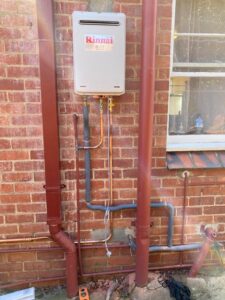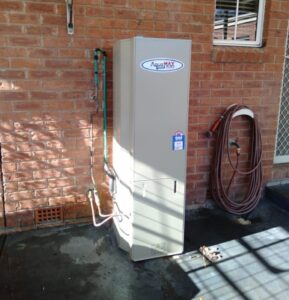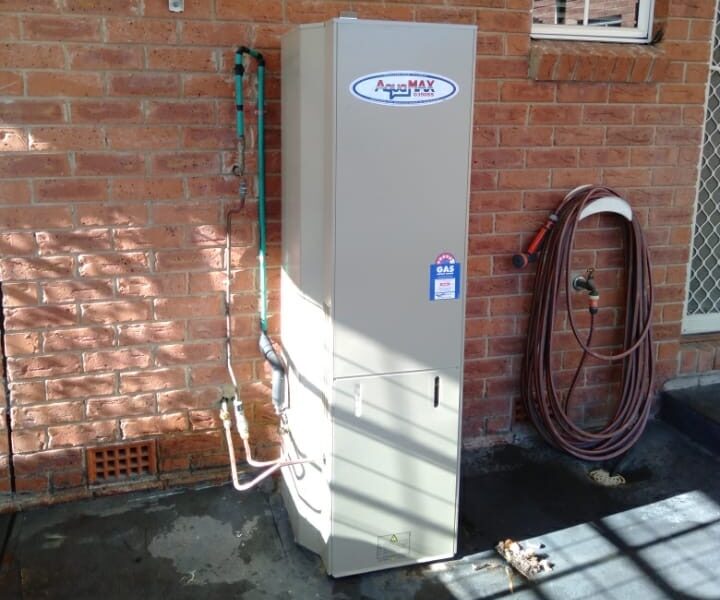How good does jumping into a hot shower feel after a long day at work or an evening after kid’s winter sport? So, how would you feel to turn on the hot tap and only freezing cold water came out how would you feel then? The feeling of joy would quickly turn to disappointment when you realised someone else had used all the hot water.
That’s why it is important to choose the right gas hot water system for your Melbourne home. Choosing the right gas hot water system can provide a continuous flow of endless hot water – who wouldn’t want that?
Why Choose a Gas Hot Water System?
- Natural Gas Water Heaters generate far fewer greenhouse gas emissions than electric storage systems.
- Gas Storage systems have quicker heat recovery times and generally use a smaller tank than a comparable electric storage system.
- Natural Gas also burns more efficiently than coal burnt to generate most electricity in mainland Australia.
- Gas Hot Water Systems are generally cheaper to buy than solar or electric hot water systems, which is great for your hip pocket.
What are the two commonly used types of gas hot water systems?
-
Continuous Flow or Instantaneous Gas Hot Water System
 As the name suggests, a Continuous Flow Gas Hot Water System delivers a continuous flow of hot water to your taps. Below we share some things to note:
As the name suggests, a Continuous Flow Gas Hot Water System delivers a continuous flow of hot water to your taps. Below we share some things to note:
- Sometimes known as a tankless hot water system, these units only heat water on demand. When you open a hot tap, cold water passes through the unit and delivers hot water to the tap. There’s NO storage tank involved as these systems rely on water passing over a heat exchanger. This means no storage of hot water is needed, so you’ll never run out of hot water.
- Continuous Flow Hot Water Systems are tiny in size compared to a storage hot water system; therefore, they take up very little room and deliver endless hot water.
- The downsides of a Continuous Flow System are:
-
- Continuous Flow Systems can have a larger lag time between opening the tap and receiving hot water compared to a storage tank as it does not run on mains water pressure. The location of the unit is critical to the lag time delay.
- Continuous Flow Water Heaters require a larger gas consumption on demand, so you may require a larger gas fitting line, which means a more expensive installation.
-
Gas Storage Hot Water System
 Gas storage hot water systems heat and store hot water within an insulated tank ready for when you need it. Below we share some things to note:
Gas storage hot water systems heat and store hot water within an insulated tank ready for when you need it. Below we share some things to note:
- Storage Tank Systems are energy efficient if a high efficiency model is chosen.
- Storage Hot Water Systems deliver hot water at mains pressure, so there is less lag time between turning on the tap and receiving hot water.
- You can also purchase quick recovery models, which will heat a cylinder in approx. one hour.
- Recovery rate means the time it takes to reheat the cold water entering the tank as you use the hot water.
- Remember storage tank hot water systems operate on this principle: as hot water exits the tank; cold water fills the tank, so this water needs to be heated.
- There are minimal installation costs associated with changing over an older storage tank system with a new one.
- The downsides of a gas storage hot water system are:
- You can run out of hot water if not sized correctly
- They are big and bulky in size.
Buy the Highest Energy Efficiency You Can Afford
When buying a gas hot water system, you should always consider buying the highest efficiency unit you can afford. The higher the energy star rating the less gas it will consume, which means fewer greenhouse gas emissions into the atmosphere and you will also save money in running costs over the long term. The cost to install a high efficiency 4-6-star system is no greater than a 1-3-star system, but you will save money in the long term and help our environment which is a ‘Win – Win’.
When Do I Need to Replace My Hot Water System?
One of the first signs that your hot water service needs replacing is if the system is leaking. Water pooling around the bottom of the hot water service or flooding onto the ground is a sure sign your water storage cylinder or heat exchanger has burst. If your hot water system is no longer under warranty, then replacement generally would be the most cost-effective option.
How Long Does a Warranty Period Last?
Depending on the make and model, most storage hot water systems come with a 5 to 12-year Manufacturer’s warranty but note this is on the storage cylinder only. All other components generally have only a 12-month warranty period.
For a Continuous flow hot water system, it will generally come with a Manufacturer’s 10-12-year warranty period but note this is only on the heat exchanger. All other components generally have a 3-year warranty period.
The big questions to answer are:
- Does the cost of repairs exceed the cost of a new unit?
- Is the likely life cycle of the existing hot water system going to be enough to warrant the cost of repairs v replacement of the unit for a more efficient model?
Is the Hot Water System the Right One for Your Needs?
Don’t just replace your hot water system with a similar brand or type to the one you have now. Over the last 10 years there have been great advancements in Hot Water Service technology and performance and there may be a system that better suits your current and future lifestyle.
Your licensed hot water plumbing expert at Essendon Plumbing Services is here to help you make an informed decision on which hot water system is right for you.
Need Your Hot Water Service Replaced?
When you’re ready for a new gas hot water system in Melbourne or you just need some professional plumbing advice, call your Licensed gas hot water plumbers at Essendon Plumbing Services.
Contact Us
Our expert Master Plumbers are here to help, whether you need us now or in the future.
Call us on 1300 193 298 or book online


 Case Study – Blocked and Broken Drain in Essendon
Case Study – Blocked and Broken Drain in Essendon

